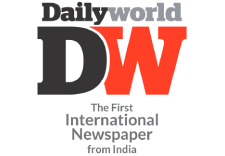New cold war, climate, China, communications & collaboration to affect higher education internationalisation: Philip Altbach, Boston College
- February 22, 2024
- Updated: 12:42 pm
Sonipat, Feb 22 : The three-day World Universities Summit organised by the International Institute for Higher Education Research and Capacity Building at O.P. Jindal Global University concluded on Wednesday with an on-site Higher Education Leaders Conclave.
Over 100+ University leaders, including Vice-Chancellors, Deans and Heads of Departments from various Universities across Delhi NCR, Haryana and UP participated in the Conclave.
Prof. Philip Altbach, Professor and Founding Director of the Center for International Higher Education, Boston College, US, delivered the keynote address.
He spoke about the crisis of internationalisation and the six Cs: The new Cold War with the Russian invasion of Ukraine, the challenges to mobility posed by Covid, Climate change, the rise of China as regional higher education hub and new modes of Communications and Collaborations, particularly with IT and AI which will affect higher education internationalisation going forward.
He emphasised the fact that India needs to think through how Indian higher education institutions would function within this changing geopolitical and socioeconomic context.
He highlighted the importance of 'internationalisation at home' by internationalising the curriculum to increase access to internationalisation for all students and to minimise the impact of physical international mobility on climate change.
Altbach stated that: 'To me research collaboration is the key and here is where India offers lot of potential. There are about 20 western universities that has research offices and collaborations in the country. I think that is to be encouraged and very useful for Indian universities.'
He further advised, 'Not to think about branch campuses but research collaborations with countries with whom India has soft-power interest like Africa, the Middle East and so on.'
During the conclave, the Founding Vice-Chancellor of O.P. Jindal Global University, Prof. C. Raj Kumar welcomed the audience by providing an overview of the proceedings of the first two days of the 4th World Universities Summit in virtual mode with twenty-five thematic sessions, 225+ Education Leaders from 20 Countries and 6 Continents.
He narrated the humble journey of O.P. Jindal Global University fifteen years ago to the organisation of the summit while reflecting on his own professional journey over the past fifteen years.
President and Distinguished Professor of Innovation and Entrepreneurship at MICA Institute, Ahmedabad, Prof. Shailendra R. Mehta delivered his inaugural address by talking about his decade-long research on the origin and development of the university in India between 600 BC and 1200 AD and its transmission to Central Asia, the Middle East, and Europe (via Jerusalem) and how it influenced the founding of European Universities including Oxford and Paris.
Mehta will be joining O.P. Jindal Global University as a Distinguished University Professor later this year to develop his research findings into a book.
The former Vice-Chancellor of the National Institute of Educational Planning and Administration (NIEPA), New Delhi, Prof. N.V. Varghese also delivered a special address at the Conclave.
In his speech, Varghese highlighted the challenges of 'diversified objectives of higher education with massification of higher education' and how 'labelling and credentialing' are becoming important with the growth of the private sector in higher education.
He further stated: "Market-friendly reforms are very important, but markets often are not people-friendly. So, the challenge for the future is how do we make markets people-friendly in the higher education field.'
The conclave concluded with a roundtable discussion.
Several Vice-Chancellors, faculty members and students present as audience participated in this discussion with Prof. Philip Altbach to reflect on the broader theme of the 4th World Universities Summit -- 'Universities of the Future: A Global Partnership for Social Justice and Sustainable Development.'
/IANS





